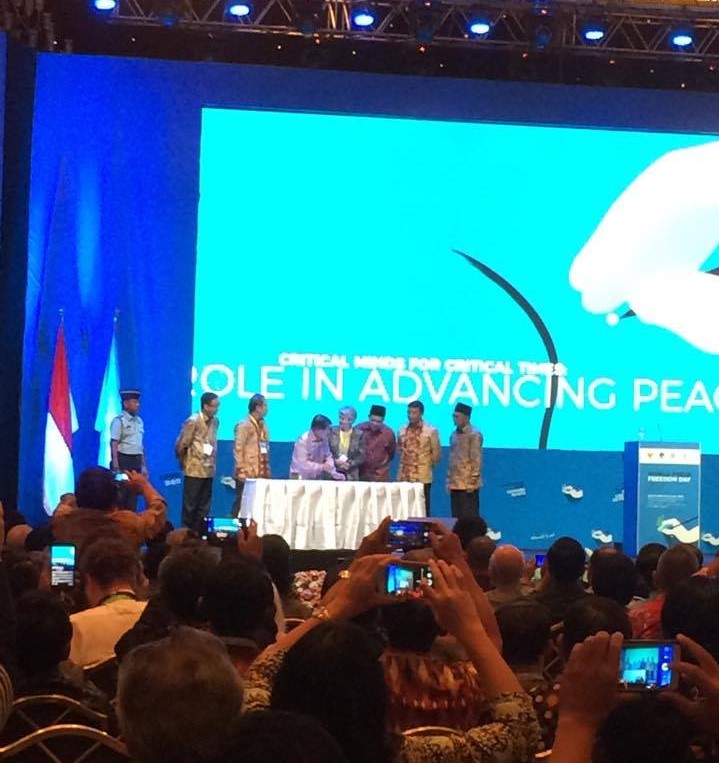
Jakarta, Indonesia 03 May – from Manowara Begum Moni
Critical Minds for Critical Times: Media’s role in advancing peaceful, just and inclusive societies
Irina Bokova is Director General of UNESCO has just inaugurated the main event of the World Press Freedom Day in Jakarta, Indonesia, environmental journalist and media researcher Monowara Begum Moni has reported from the spot.Every year, 3 May is a date which celebrates the fundamental principles of press freedom; to evaluate press freedom around the world, to defend the media from attacks on their independence and to pay tribute to journalists who have lost their lives in the exercise of their profession.
UNESCO, the Government of Indonesia, and the Press Council of Indonesia have co-organised the World Press Freedom Day’s main event and the UNESCO/Guillermo Cano World Press Freedom Prize Ceremony in Jakarta, Indonesia, from 1-4 May 2017.
National celebrations take place each year to commemorate this Day. UNESCO leads the worldwide celebration by identifying the global thematic and organizing the main event in different parts of world every year.
The international day was proclaimed by the UN General Assembly in 1993 following a Recommendation adopted at the 26th Session of UNESCO’s General Conference in 1991. This in turn was a response to a call by African journalists who in 1991 produced the landmark Windhoek Declaration on media pluralism and independence. – UNESCO.
A press release issued by the – World Press Freedom Day 2017 Media centre said: Indonesian Vice President Jusuf Kalla opened the World Press Freedom Day 2017 at the Jakarta Convention Center on May 3, 2017.
According to the vice president, by hosting of the World Press Freedom Day, Indonesia strengthens its position especially in maintaining the press in playing its good and responsible role for the interest of the nation and the people.
The media in Indonesia had previously been under government’s control and highly restricted by certain regulations. But as of 1998 since the start of the reform era, the situation changed to be more democratic marking the guarantee of the system of democracy, the autonomous administrative system, and the freedom of the press.
He pointed out that in such a condition, Indonesia proves that it respects the freedom of the press in the country. In addition, the freedom of expression is guaranteed by the Constitution.
He is of the opinion that the freedom of the press is very important, particularly in its role to help enhance the national development.
Indonesia is a country where Islam is adhered to by most of its people, democracy runs well and the freedom of the press develops greatly, the vice president said, adding that such a condition is not found in many countries.
He also explained that unlike in the past, the media in Indonesia now have been experiencing a lot of changes as media companies should no longer need permits to set up their media businesses. This has brought about thousands of print and electronic media companies running in the country. However, the government issues regulations especially for electronic media but merely for regulating frequencies.
The media in Indonesia enjoy the freedom of the press, namely the freedom for the interest of the country, he said, adding that they do not face censorship but they have to abide by the ethics code.
He further said that the freedom of expression should be carried out to make situation more just and peaceful but not create conflicts.
Thus, the media have to be responsible for their coverage to guarantee that their stories would help maintain justice and peace.
The vice president also pointed out that mass media have currently enjoyed development of technology which should be managed well, unless it could also bring about negative results.
Likewise, he reminded the media of making stories for the benefits of all the people. According to him, the government need criticism from the media but they should also be responsible and objective in producing their stories for the interest of the nation and the people.
Moni adds: The Indonesian capital city is full of high-rise buildings but the communication system or transport system is very poor. The public transport is “trans Jakarta” a very weak system for 10 million Jakarta population .
To get ride on a bus one has to walk a long and uncomfortable overbridge. It’s really a troublesome process. I can see that only young people are using this over bridge. For sick, old and pregnant women this transport over bridge is useless as they cannot. At the same time everywhere there are traffic jam approximately like Dhaka
The people are very helpful and friendly. There is huge and beautiful green that France is interested to work with Indonesia to uplift the green area in France. There are also three categories of taxis depending on prices and different quality.
GW News Desk with Monowara Begum Moni
(An environmental journalist Monowara Begum Moni is also a media researcher based in Germany)




